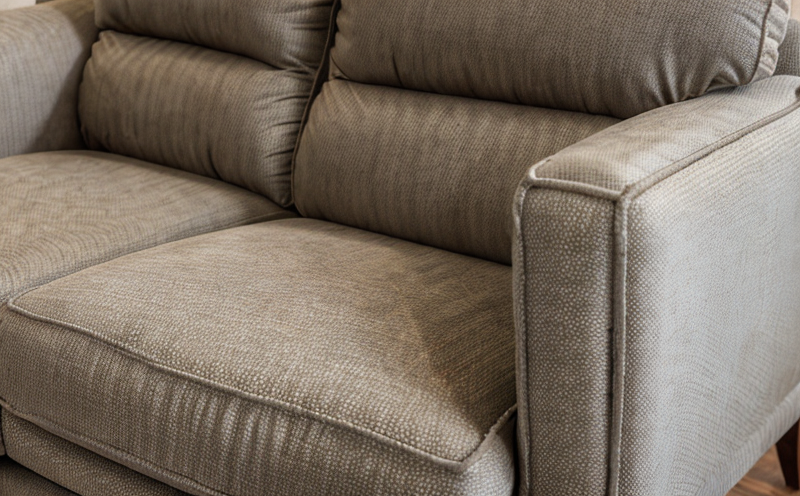Fire Resistance Testing of Conference Room Seating
The fire safety testing of conference room seating is a critical aspect of ensuring public safety and compliance with international standards. Fire resistance tests are designed to evaluate the ignition and flame spread properties of furniture, particularly upholstered items like chairs and sofas used in high-traffic areas such as conference rooms.
Conference room seating often features dense upholstery made from materials that can contribute significantly to the rapid spread of fire if exposed to an ignition source. Proper testing ensures that these seats meet strict flammability standards set by regulatory bodies, such as ISO 19296 for seating furniture used in public places.
The process involves several key steps. First, the chairs are prepared according to the test specifications, which may include positioning them on a standardized support structure. Next, they undergo an ignition procedure where an open flame is applied to the seat's surface. The duration and intensity of this flame depend on the specific standard being followed (e.g., EN 13827 for seating in public areas).
After ignition, the test monitors how quickly flames spread across the material. This includes observing the time taken for the fire to reach predetermined distances or until it extinguishes naturally without intervention. Additionally, temperature measurements are taken at various points around the chair to assess heat release rates and potential hazard levels.
The results of these tests provide valuable data on the performance characteristics of different seating materials under controlled burning conditions. This information helps manufacturers improve their products by selecting flame-retardant fabrics or alternative fire-resistant components. Compliance with such testing also reduces liability risks for organizations that use this furniture in public spaces.
For instance, schools, hospitals, and government institutions often specify fire resistance as one of the criteria when purchasing new office equipment. By investing in properly tested seating, these entities can ensure they are meeting legal requirements while simultaneously promoting a safer working environment.
In summary, fire resistance testing plays an essential role in safeguarding public health by preventing potential fires from escalating into larger disasters within confined spaces like conference rooms. It serves both as a quality assurance measure for manufacturers and as a regulatory requirement enforced by governments worldwide.
Eurolab Advantages
At Eurolab, we specialize in delivering comprehensive fire safety testing services tailored specifically to the unique challenges faced by furniture manufacturers. Our state-of-the-art facilities equipped with advanced equipment allow us to conduct precise and reliable tests that meet all relevant standards.
- Accreditation: We hold ISO/IEC 17025 accreditation, ensuring our methods are validated and consistent.
- Expertise: Our team comprises highly skilled engineers and scientists with extensive experience in fire safety research.
- Technology: Utilize cutting-edge technology such as thermogravimetric analysis (TGA) and differential scanning calorimetry (DSC).
Our commitment to excellence extends beyond just conducting tests; it includes providing detailed reports that offer actionable insights into how your products perform under various fire scenarios. This knowledge can help guide further improvements in product design and material selection.
Quality and Reliability Assurance
- Standard Compliance: Ensure strict adherence to international standards such as ISO 13567-1 for bench scale tests of upholstered seating furniture.
- Data Accuracy: Use sophisticated instrumentation capable of measuring critical parameters like peak heat release rate and smoke production.
We employ rigorous quality control measures throughout every stage of the testing process. From specimen preparation to final analysis, our procedures are meticulously documented and reviewed by independent auditors. This ensures that all results are accurate and reproducible.
In addition to technical expertise, Eurolab maintains robust data management systems to store and analyze large datasets efficiently. Our software solutions facilitate seamless collaboration between testing teams and clients, enabling faster turnaround times for test reports.
Environmental and Sustainability Contributions
- Eco-Friendly Materials: Promote the use of sustainable materials that are inherently fire-resistant or treated with non-toxic flame retardants.
- Energy Efficiency: By reducing flammability, we contribute to lower energy consumption during manufacturing processes. Less heat generation means less need for cooling systems.
The increasing emphasis on sustainability has led many organizations to seek out greener alternatives in their supply chains. Eurolab supports this trend by offering eco-friendly testing options that align with global environmental initiatives like the ISO 14001 certification program.
Through our fire resistance testing services, we help companies minimize waste and reduce their carbon footprint. For example, by identifying high-performance materials early in the development process, manufacturers can avoid costly rework later on due to failed compliance checks.
Our approach not only enhances product safety but also fosters innovation towards more sustainable practices within the industry.





